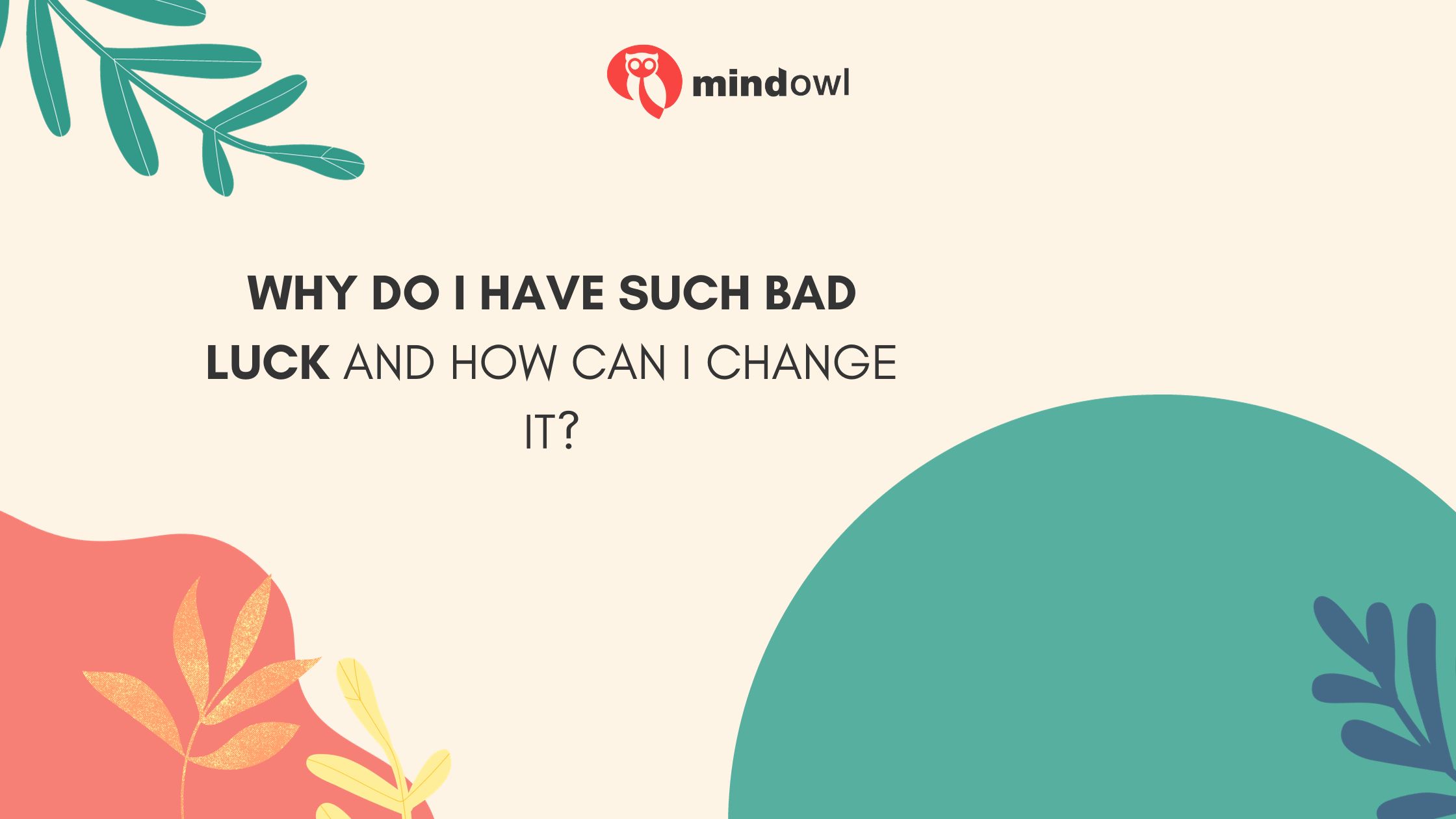
Do you ever wonder why misfortune seems to follow you? You’re not alone in feeling plagued by a string of bad luck, with many people sharing this sentiment. In this article, we uncover the underlying factors contributing to what you call ‘bad luck’ and offer ways to turn your fortunes around.
Keep reading; it’s time for change!
Key Takeaways
- Bad luck is often tied to a lack of control, negative thinking, self-sabotage, surrounding oneself with negativity, victim mentality, and a lack of purpose or direction.
- Improving luck involves taking responsibility for thoughts and actions, focusing on the positive, and changing mindset to attract better fortune.
- Hard work and perseverance play an essential role in achieving success alongside luck. Recognizing this empowers individuals to take control of their lives rather than depending solely on chance.
Understanding the Concept of Bad Luck

People often see bad luck as a string of unfortunate events that just happen to them. They might think it’s like a dark cloud that follows wherever they go. But it’s not about being born under a bad star or having fate against you.
Bad luck isn’t something out there that picks on certain people.
Instead, some believe there are higher powers at play or karma dealing out what one deserves. Others feel superstitious, avoiding black cats and ladders thinking these actions can keep bad luck away.
Yet for many, the sense of bad luck is tied to their own choices and how they react to the world around them. Moving from this topic, we look into the root causes behind such feelings of misfortune.
The Root Causes of Bad Luck:
Belief in lack of control, negative thinking, self-sabotage, surrounding yourself with negativity, victim mentality, and lack of purpose or direction all contribute to experiencing bad luck.
Belief in lack of control
Some people feel they can’t change what happens in their lives. They think luck is not something they can touch or see, so it’s out of their hands. Studies say these folks may not use the part of the brain that helps plan and solve problems as well.
If you always think “I’m just unlucky,” your mind might miss chances to make things better. You could walk past an open door because you’re looking down at your bad luck. To turn this around, start believing you have power over your life.
See yourself as the driver, not just a passenger on life’s journey.
Thinking positive and knowing you’re in control sends you towards a brighter path. The next step is to tackle negative thinking head-on.
Negative thinking
Having little belief in your control over life can lead to negative thinking. This kind of thinking makes you see the world in a dark way. You might feel like bad things will always happen, and this can make you think you’re unlucky.
Negative thoughts twist how you see what happens to you. If you believe that nothing good ever comes your way, it’s likely because your mind only notices the bad stuff.
Breaking free from negative thinking is key to changing how lucky or unlucky you feel. Instead of seeing everything as either very good or very bad, try to find the middle ground. Look for small wins every day instead of waiting for big moments of luck.
This shift in mindset can help turn around how much control and self-belief you have over improving your luck and changing destiny.
Self-sabotage
Sometimes people do things that stop them from succeeding. They might not even know they’re doing it. This is called self-sabotage, and it can really mess with your luck. People do this for many reasons, like feeling scared or not believing in themselves enough.
They may think badly about themselves and say things like “I can’t do this” or “I’m not good enough”. Those thoughts make it hard to win at life.
If you grew up being told you had to be perfect to be worth something, you might push yourself too hard. And when things don’t go as planned, you might feel very bad and start thinking nothing will ever work out for you.
To stop this cycle of bad luck caused by self-sabotage, first understand why you’re scared and where those fears come from. Then try to slowly change these habits that are holding you back.
Next is the challenge of dealing with people who bring negative vibes into your life.

Surrounding yourself with negativity
Moving on from the idea of self-sabotage, let’s discuss how being around negative things and people can affect our lives. If you are always with friends or family who see the bad in everything, their outlook can rub off on you.
You might start to only notice what goes wrong and miss when things go right. This can make it seem like you have terrible luck because you’re not seeing the whole picture.
Choosing to be around positive vibes is important for turning things around. If your work or home is full of complaints and gloomy talk, this mood can stick to you like glue. It makes it hard for good stuff to find its way into your life.
To overcome bad luck, try finding people and places that make you feel hopeful and happy instead of bringing you down. This change won’t just happen; it takes effort to move towards positivity but doing so can transform your outlook and experiences.
Victim mentality
Some people feel like they can’t catch a break and that the world is against them. This is often due to what’s known as a victim mentality. If you have this mindset, you might think you are always going to have bad luck.
You see yourself as someone bad things happen to no matter what. It’s like wearing glasses that only show life’s tough parts.
This way of thinking may come from hard times or hurtful events in your past. These experiences can make it feel safer to expect the worst instead of hoping for the best. But there is good news – you can turn things around! Recognising how you think about yourself and your luck is step one.
Once aware, try different ways of dealing with problems.
Understanding this pattern helps people escape from feeling helpless or terribly unlucky all the time. New thinking strategies help break free and take control back over their lives.
Next, let’s look at how making changes in ourselves can lead us away from misfortune toward improving our destiny.
Lack of purpose or direction
Feeling like you have bad luck might come from not having a clear purpose or direction. People with this view often think that good things or bad things just happen to them by chance.
They believe they can’t do much to change their destiny because it’s set by forces beyond their control. This feeling can make someone feel stuck and helpless.
It’s important to realise that knowing what you want in life can turn your luck around. Finding your own goals and working towards them helps you control your life more. You start making choices that move you forward, rather than leaving it all up to chance.
It leads right into the next step: taking charge of how you think and act to improve your luck.
How to Improve Your Luck
Focus on the positive, take responsibility for your thoughts and actions, and change your mindset to attract better luck. Learn more about practical ways to turn your luck around by reading further.
Taking responsibility for your thoughts, feelings, and actions
Improving your luck starts with taking responsibility for your thoughts, feelings, and actions. It’s essential to acknowledge that you have control over how you think, feel, speak, and act.
Blaming external factors for bad luck only perpetuates a victim mentality. Recognizing that you are accountable for your own life and emotions empowers you to make positive changes.
Adopting a mindset of self-responsibility helps in dispelling the belief in luck being an external force beyond your control. Understanding that your attitude towards life can influence your luck is crucial in improving it.
Focusing on the positive
By taking responsibility for your thoughts, feelings, and actions, you can transform your perspective. Embracing a positive mindset is crucial to improving your luck. Shift your focus from dwelling on misfortune to seeking opportunities for growth.
Recognize the potential in every setback and learn from the experience. Cultivating an optimistic outlook empowers you to navigate challenges with resilience, increasing the likelihood of attracting positive outcomes.
Furthermore, acknowledging the silver linings in difficult situations can bolster your mental strength and perseverance. It enables you to harness the power of optimism while facing adversity, contributing to a more favorable trajectory in life.
Pushing through tough times
When facing tough times, it’s important to acknowledge that setbacks and challenges are a natural part of life. It’s crucial to approach difficulties with resilience and determination, understanding that overcoming them can lead to personal growth and strength.
Embracing the mindset that tough times are temporary can help in finding solutions and maintaining hope. Remember: confronting challenges head-on can often yield valuable lessons and opportunities for positive change, ultimately shaping a brighter future.
During difficult periods, focusing on small victories or progress can provide motivation and encouragement. Keeping a proactive attitude amidst adversity is key, as it empowers individuals to take control of their circumstances rather than succumbing to them.
Changing your mindset
To change your luck, start by changing your mindset. Instead of seeing yourself as unlucky, focus on the positive aspects of your life. Embrace a belief that you have control over your thoughts, feelings, and actions.
By shifting to a more positive outlook, you can attract good luck and opportunities into your life. Replace negative thinking with affirmations and gratitude to cultivate a more optimistic mindset.
Remember that luck is often a self-fulfilling prophecy – if you believe in good fortune and take proactive steps towards it, you’re likely to experience more positive outcomes. Surround yourself with positivity and seek out supportive people who uplift and inspire you.
Debunking the Myth of Luck
Hard work and perseverance play a significant role in achieving success, debunking the widely held belief that luck is the primary factor.
The role of hard work and perseverance
Many believe that luck alone determines success, but the reality is more complex. While luck certainly plays a part in our lives, hard work and perseverance are equally crucial. It’s important to acknowledge the influence of both factors.
Research shows that a combination of effort, resilience, and strategic decision-making significantly contributes to achieving goals and overcoming challenges. Realizing this empowers individuals to take control of their lives rather than depending solely on chance.
Effort and perseverance complement luck by providing a foundation for seizing opportunities when they arise. They enable individuals to navigate setbacks with determination, learn from failures, and keep moving forward towards their aspirations.
Recognizing the role of hard work and perseverance can instill a sense of agency and purpose, propelling individuals towards positive outcomes even in challenging circumstances.
Improving your luck involves taking responsibility for your thoughts, feelings, and actions
The power of positive thinking
Believing in good things can bring good things into our lives. When we focus on positive thoughts and possibilities, it changes the way we see the world. This shift in mindset can create opportunities for good things to happen and help us cope with challenges more effectively.
It is important to replace negative or toxic thoughts with truth and consciously choose what limits to place on our minds. By doing so, we can change our outlook and improve our overall well-being, leading us towards a brighter future full of possibilities.
Debunking myths about luck can also empower us to take control of our own destiny and make positive changes in our lives.
Practical Ways to Change Your Luck
Set achievable goals, practice self-compassion and accountability, let go of limiting beliefs, and make positive changes in your life.
Set achievable goals
To change your luck, start by setting achievable goals. Focus on what you can do to improve your situation rather than feeling stuck in bad luck. By setting small and attainable goals, you can take proactive steps towards changing your circumstances and creating more positive outcomes for yourself.
Remember that taking action can help shift your mindset away from the belief that you are simply unlucky.
By focusing on actionable steps and manageable objectives, you empower yourself to make positive changes in your life. This forward-looking approach helps to break free from a negative cycle and proactively work towards better opportunities and outcomes.
Practice self-compassion and accountability
To change your luck, it’s important to practice self-compassion and accountability. Self-compassion involves being kind and understanding towards yourself, especially in challenging times.
It helps overcome fear and anxiety by nurturing a compassionate relationship with ourselves. This means taking a break, being kind to ourselves, and regularly showing compassion and consolation.
On the other hand, practicing accountability entails taking responsibility for our thoughts, feelings, and actions. By acknowledging our role in creating our own reality, we can empower ourselves to make positive changes and improve our outlook on life.
Let go of limiting beliefs
Letting go of limiting beliefs is crucial for improving your luck and changing your outlook. Recognizing negative thought patterns that hold you back from achieving success is the first step.
Embracing a positive mindset and challenging those limiting beliefs with self-compassion can empower you to make positive changes in your life, setting achievable goals and making room for serendipity and providence.
Identifying and transforming limiting beliefs can lead to a sense of satisfaction, paving the way for personal growth and success. By taking responsibility for your thoughts, feelings, and actions, you can break free from the cycle of bad luck caused by self-sabotage or victim mentality.
Make positive changes in your life
To improve your luck, make positive changes in your life. Set achievable goals and take small steps towards them every day. Practice self-compassion and hold yourself accountable for your actions.
Let go of limiting beliefs that hold you back from reaching your full potential. Surround yourself with positivity and embrace a mindset focused on growth and resilience.
By making these positive changes, you can start shifting the energy around you, creating opportunities for good luck to come your way. Remember, taking action is key to changing your circumstances and improving your overall luck in life.
Seeking Professional Help
Consider therapy as a valuable resource for overcoming negative beliefs and patterns, while also reaching out to trusted loved ones for support.
Considering therapy
Therapy can be helpful if you find yourself constantly feeling like bad luck follows you. It’s not just for people with serious mental health issues, but it can also provide support to anyone struggling with negative beliefs.
Many individuals might avoid therapy due to stigma or mistrust in mental health services, even though seeking help could significantly improve their well-being and help them change their mindset about luck and control.
Furthermore, there are practical ways through therapy to address distorted beliefs about bad luck and learn how to take charge of your thoughts and feelings. By doing so, you can gain a greater sense of control over your perceived destiny and start making positive changes in your life.
Seeking support from loved ones
Support from loved ones is crucial when dealing with mental health challenges. It’s important for them to know that you are there for them without judgment or pressure. Patience and understanding play a significant role in encouraging them to seek professional help while providing the necessary emotional support they need.
Remember, their journey towards seeking help may take time, but your unwavering presence can make a difference in their decision-making process.
It’s essential to approach the topic with empathy and compassion, allowing them to feel heard and supported. Check-in regularly and offer assistance in finding suitable resources or professionals if needed.
Conclusion & Takeaways
In conclusion, understanding the concept of bad luck is crucial for taking control of it. By recognizing the root causes and debunking myths, it becomes clear that improving luck is within our power.
Practical steps like changing mindset and seeking professional help can lead to positive changes. Remember, luck isn’t just about chance – with the right approach, anyone can change their fortunes.
FAQs
Q: Why do I always seem to have such bad luck?
A: Everyone experiences some negative things in their life, but if you feel like you are always unlucky, it might be time to take a new perspective on things. The idea of bad luck is often a matter of mindset and attitude, so perhaps changing your perspective can help change your luck.
Q: How can I change my bad luck?
A: To change bad luck, try to stay positive and focus on the good things that happen in your life. Sometimes bad things do happen, but successful people often find ways to see the positive and maintain a new perspective.
Q: What is considered as “bad luck” in life?
A: Bad luck can be different for everyone, but it generally refers to a series of negative events or occurrences that seem to happen without any control. It could be anything from feeling like you can’t find love to constantly feeling like you don’t get the job.
Q: Can my bad luck change in any way?
A: Yes, your luck can change, and often, it starts with changing your mindset. No matter how hard things may seem, it’s important to remember that luck is a state of mind and that small changes in attitude can make a big difference.
Q: Why do bad things always happen to me, even when I try to stay positive?
A: It’s possible that you have been passively adopting a negative mindset, which can make you more likely to suffer from bad luck. Try to stay conscious of the company you keep, as sometimes the people around us can impact the way we perceive and experience our luck.
Q: How can I stop being a magnet for bad luck?
A: To stop being a magnet for bad luck, consider reevaluating your mindset and reactions to events. It might also be helpful to surround yourself with positive influences and remember that luck and others’ attitudes can impact your own fortune.
Q: What can I do when it seems like really bad luck just won’t let up?
A: When it feels like you’re constantly facing bad luck, it’s important to try to stay resilient. Keep trying to maintain a positive mindset and keep looking for ways to change your luck. Sometimes, seeking support from others can also help change your perspective.
Q: How can being a good person attract good luck and repel bad luck?
A: Being a good person can influence the way you think and act, often attracting positive things into your life. Conversely, it can repel negative things or promote resilience in the face of bad luck. While it’s not a guaranteed solution, being a good person can help influence your overall perception of luck.
Q: Why do I always seem to find myself in situations where something bad happens?
A: It’s common to feel this way during a streak of bad luck, but it’s important to remember that bad luck does not define who you are. While it may feel like bad things always happen to you, remember that your mindset and actions can influence the outcomes of situations.
MindOwl Founder – My own struggles in life have led me to this path of understanding the human condition. I graduated with a bachelor’s degree in philosophy before completing a master’s degree in psychology at Regent’s University London. I then completed a postgraduate diploma in philosophical counselling before being trained in ACT (Acceptance and commitment therapy).
I’ve spent the last eight years studying the encounter of meditative practices with modern psychology.

